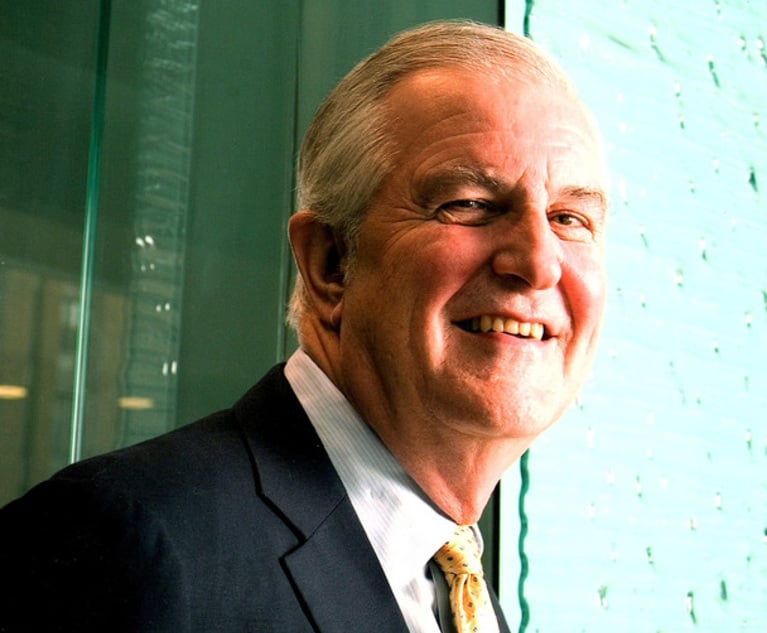 Photo: Shutterstock
Photo: ShutterstockHow to Manage The Firm When Business Starts to Pick Back Up
Editor's note: This is the third in a series of articles from LawVision's strategy group looking at what each core function of a law firm needs…
April 08, 2020 at 01:10 PM
6 minute read
Editor's note: This is the third in a series of articles from LawVision's strategy group looking at what each core function of a law firm needs to focus on in specific phases of the coronavirus recovery. The first article looked at what they should focus on as the market awaits the viral peak, the second explored the months right after the peak. This article examines efforts that should be in place in the four to six months after the viral peak.
Recovery of Business Activity Phase (4-6 months after the peak)
Firm Leadership—continuation of the relevant tasks from the preceding stages, plus, you should quickly assess and plan for near-term operations in the new normal for:
- Market positioning—did you realize or develop something unique and valuable to clients and prospects while working virtually?
- Size of the overall practice—Given the demand projections from all client meetings, as collected and summarized by the marketing/BD team, what is a conservative estimate for demand for your lawyers' time? What is your current supply of lawyer time and how will you balance the two?
- Talent model—Given the responses to the prior question, is there a need and a receptivity for a different talent model right now (e.g., more use of a "lawyers on demand" model for specific matters or tasks)?
- Competitive landscape—What has changed with the competition? Did anyone make significant strides? Are there any significant merger or acquisition prospects that require immediate attention?
- Changes to business model—Given your experiences with remote working, which aspects will become permanent features of working at your law firm?
Partners—continuation of the relevant tasks from the preceding stages, plus:
- Bring a new mindset into work—when normal office operations resume, do not drag the firm back into the old normal. Rather, contribute to the development of the new normal, starting with the honest and objective tick-lists initiated in the prior stage. Turn these into firm leadership for assessment and summarization.
- Bring a new sense of receptivity toward client service improvement concepts such as project management, process improvement, pricing creativity and client/matter level profitability reporting.
Talent/HR—continuation of the relevant tasks from the preceding stages, plus:
- Make recommendations to the compensation committee to recognize those who contributed most to stabilizing the firm.
- Get performance reviews back on schedule and update the evaluation to include the ability to work and contribute remotely.
- Begin to practice participative goal setting in these new roles to help employees feel like they have some control over their own success and some ownership around the success of the firm.
- Use the information gleaned from the evaluation process to further inform a formal summary report to firm leadership on the firm's culture and how the lawyers and staff handled the transition to working virtually, the fallout from the transition, and the recovery to date (started in the prior stage).
- Start to instill a culture of innovation via a series of contests or idea exchanges at all levels of the firm. Create excitement around participation towards bringing new value to the firm and its clients. Implement some small ideas for improvement, celebrate efforts, and build momentum.
- Make recommendations to the compensation committee to recognize those who contributed most to stabilizing the firm.
- With firm leadership, develop communications strategy around any messaging needed in association with year-end bonus, salary and promotion decisions impacted by Covid-19 events, with the goal of retaining most valuable lawyers and staff.
- With firm leadership, start messaging about the long-term prospects of the firm. By this point, to sustain confidence, people should feel some hope that the firm can thrive, not just survive. People need to have some confidence in the years ahead to stay.
Accounting & Finance—continuation of the relevant tasks from the preceding stages, plus:
- Make recommendations with respect to year-end distributions and (hopefully) bonuses and adjustments for 2021.
- Examine the firm's capital base and, if needed, start messaging and planning around increased capital requirements.
- If debt was used heavily to prop up the firm during the first two stages, prepare a summary report for the partners on how and when this debt will be repaid and the related impact on the firm's profitability during the major pay-back periods.
- Make recommendations to the compensation committee to recognize those who contributed most to stabilizing the firm.
- Rethink performance criteria and develop new metrics to evaluate contributions in the new normal business model.
Marketing/Business Development—continuation of the relevant tasks from the preceding stages, plus:
- Summarize for firm leadership, and then all partners, all information learned from the client visits, including: • Likely demand for the remainder of 2020 and all of 2021. • New or rapidly developing areas of client service that did not exist prior to the pandemic. • Declining areas of client service that were strong prior to the pandemic. • Prospective clients based on what the partners heard from competitors in distress. • Recommended action steps and related budgetary requirements. • Ramp up coaching efforts and support around those partners who have the greatest growth potential for the firm on a short-term basis.
IT & Operations—continuation of the relevant tasks from the preceding stages, plus:
- Finalize recommendations to firm leadership and the accounting & finance team on any major adjustments or recommended investments in the technology platform and remote working environment.
- Assess for firm leadership, at a high level and based on recent remote working experiences, the viability of major cost-saving operational concepts such as: • Reduced office space needs based on a segment of the firm working remotely. • Relocation of support services to lower cost locations. • Office sharing–particularly for younger lawyers. • Hoteling, either in conjunction with more scheduled remote working days for lawyers and staff or as a stand-alone concept. • Single-size offices, for firms that have not yet moved in that direction. • Overall review of whether the firm could benefit from exercise of any upcoming space give-back options (and the associated changes and costs to do so) as well as rethinking plans for any upcoming lease renewals or new leases.
- Concurrently, assess the benefits and risks associated with outsourcing any non-core support services that are still maintained by the firm.
The next and final piece in this series will address the measures various firm departments should take once revenue and profitability levels begin to return.
This content has been archived. It is available through our partners, LexisNexis® and Bloomberg Law.
To view this content, please continue to their sites.
Not a Lexis Subscriber?
Subscribe Now
Not a Bloomberg Law Subscriber?
Subscribe Now
NOT FOR REPRINT
© 2025 ALM Global, LLC, All Rights Reserved. Request academic re-use from www.copyright.com. All other uses, submit a request to [email protected]. For more information visit Asset & Logo Licensing.
You Might Like
View All
Demand Growth to 'Likely Weaken' in 2025 After 'Anomalies' Propelled Big Law Profits in 2024
5 minute read


Capital Markets Partner Rejoins O’Melveny Ahead of Expected Uptick in Demand
Trending Stories
- 1How We Won: BraunHagey’s $56M Trademark Win Over Molson Coors Upheld by 9th Circuit
- 2DLA Piper NY Office Adds Ex-Verizon GC As Big Law Goes on In-House Hiring Spree
- 3ExxonMobil Sues California AG Bonta, Environmental Groups for Advanced Recycling 'Smear Campaign'
- 4'I've Had a Lot of Fun With Opinions': A Look Back at 10 Quintessential Opening Lines From Vice Chancellor Glasscock
- 5US Attorney Phillip Talbert Announces Resignation
Who Got The Work
Michael G. Bongiorno, Andrew Scott Dulberg and Elizabeth E. Driscoll from Wilmer Cutler Pickering Hale and Dorr have stepped in to represent Symbotic Inc., an A.I.-enabled technology platform that focuses on increasing supply chain efficiency, and other defendants in a pending shareholder derivative lawsuit. The case, filed Oct. 2 in Massachusetts District Court by the Brown Law Firm on behalf of Stephen Austen, accuses certain officers and directors of misleading investors in regard to Symbotic's potential for margin growth by failing to disclose that the company was not equipped to timely deploy its systems or manage expenses through project delays. The case, assigned to U.S. District Judge Nathaniel M. Gorton, is 1:24-cv-12522, Austen v. Cohen et al.
Who Got The Work
Edmund Polubinski and Marie Killmond of Davis Polk & Wardwell have entered appearances for data platform software development company MongoDB and other defendants in a pending shareholder derivative lawsuit. The action, filed Oct. 7 in New York Southern District Court by the Brown Law Firm, accuses the company's directors and/or officers of falsely expressing confidence in the company’s restructuring of its sales incentive plan and downplaying the severity of decreases in its upfront commitments. The case is 1:24-cv-07594, Roy v. Ittycheria et al.
Who Got The Work
Amy O. Bruchs and Kurt F. Ellison of Michael Best & Friedrich have entered appearances for Epic Systems Corp. in a pending employment discrimination lawsuit. The suit was filed Sept. 7 in Wisconsin Western District Court by Levine Eisberner LLC and Siri & Glimstad on behalf of a project manager who claims that he was wrongfully terminated after applying for a religious exemption to the defendant's COVID-19 vaccine mandate. The case, assigned to U.S. Magistrate Judge Anita Marie Boor, is 3:24-cv-00630, Secker, Nathan v. Epic Systems Corporation.
Who Got The Work
David X. Sullivan, Thomas J. Finn and Gregory A. Hall from McCarter & English have entered appearances for Sunrun Installation Services in a pending civil rights lawsuit. The complaint was filed Sept. 4 in Connecticut District Court by attorney Robert M. Berke on behalf of former employee George Edward Steins, who was arrested and charged with employing an unregistered home improvement salesperson. The complaint alleges that had Sunrun informed the Connecticut Department of Consumer Protection that the plaintiff's employment had ended in 2017 and that he no longer held Sunrun's home improvement contractor license, he would not have been hit with charges, which were dismissed in May 2024. The case, assigned to U.S. District Judge Jeffrey A. Meyer, is 3:24-cv-01423, Steins v. Sunrun, Inc. et al.
Who Got The Work
Greenberg Traurig shareholder Joshua L. Raskin has entered an appearance for boohoo.com UK Ltd. in a pending patent infringement lawsuit. The suit, filed Sept. 3 in Texas Eastern District Court by Rozier Hardt McDonough on behalf of Alto Dynamics, asserts five patents related to an online shopping platform. The case, assigned to U.S. District Judge Rodney Gilstrap, is 2:24-cv-00719, Alto Dynamics, LLC v. boohoo.com UK Limited.
Featured Firms
Law Offices of Gary Martin Hays & Associates, P.C.
(470) 294-1674
Law Offices of Mark E. Salomone
(857) 444-6468
Smith & Hassler
(713) 739-1250








